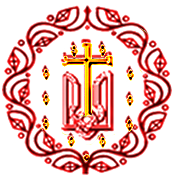- Home
-
APC - Historic Federation
- "Declaration for Revival of Orthodoxy" - Birth of the APC
- Apostolic Succession and Brief Historical Background
- Confession of Faith of the Apostolic Orthodox Church
- Holy Canons of the Church
- OFFICIAL NOTICE: Regarding the Russian Orthodox Church and war in Ukraine
- OFFICIAL PUBLIC NOTICE: Regarding the Hierarchs of the Apostolic Orthodox Church and "Primate" +GRIGORY (Mikhnov)
- TOMOS
-
UAOC History
- UAOC Churches and the Ecumenical Patriarchate
- UAOC in the USA
- Patriarch +JOSYF Slipyj - Testament on the Ukrainian Mother Church
- Institute for Eastern Christian Studies
- "Hierarchy and Laity in the Orthodox Church" by Fr. John Meyendorff
- Differences Between Orthodoxy and Roman Catholicism
- An Orthodox Response on a Roman Catholic Declaration on the "Nature of the Church"
- Videos >
- Apostolic Succession
- Holy Synod
- SEC of Orthodox Bishops
- Orthodoxy
- Sacraments
- Married Bishops
- Deaconess
- African Province
-
American Province
- Co-Cathedral of St. Raphael in California
- Archeparchy of Australia and New Zealand
- Archeparchy of Hawaii
- Archeparchy of Brazilia (English)
- Exarcado do Brasil (Hispanic)
- Exarchate of St Thomas the Apostle - Sicily, Calabria and Sardinia (Italy)
- Italo-Byzantine Orthodox Archeparcy - Lazio (Italy), Malta and San Marino
- Byzantine Orthodox Catholics in Africa
- French Province
- OSB - Africa (N)
-
Divine Liturgy, Rituals/Rubrics
- UKASE on Liturgical Texts
- Order of General Confession
- Prayers of Preparation Before Holy Communion
- Order of Preparation For the Divine Liturgy + The Kairon – The Orthros +
- The Vesting
- The Prothesis
- + The Divine Liturgy of St. John Chrysostom + (with Rubrics for Bishop, Priest & Deacon)
- Prayers of Thanksgiving After Holy Communion
- Trisagion Prayers for the Dead
- St. Thomas of the USA
- Western Rite Vicariate - Holy Face of Jesus Skete - Little Brothers & Sisters of Jesus of the Most Blessed Sacrament
- Vocations to the Venerable Priesthood, Diaconate or Religious Life
- Contact, Inquiries and Prayer Requests
- SISTER CHURCHES & DEPENDENCIES ON DIPTYCHS OF THE UAOC
- + Orthodox Liturgical Calendar +
- + + OUR CHRONOLOGICAL AFFILIATION WITH THE ECUMENICAL PATRIARCHATE OF CONSTANTINOPLE + +
- ORTHODOX CHURCH OF AMERICA DIRECTORY & LOCATIONS -- PARISHES, DOMESTIC CHAPELS TO SERVE YOU

+ ORTHODOX CHURCH OF AMERICA +
Ukrainian Autocephalous Orthodox Church
All Content Copyright (c) 1951, 2005-2025 BY ORTHODOX CHURCH OF AMERICA
ALL RIGHTS RESERVED, PROTECTED BY US & INTERNATIONAL COPYRIGHT
"The Mission of the Orthdoox Church of America, the local Orthodox Christian Church of the
Ukrainian historic Kyivan Metropolitanate and Authorized by the Tomos of 1924 from the
Ecumenical Patriarchate of Constantinople, is to be faithful in fulfilling the mandates of
Jesus Christ to "Go into all the world and make disciples of all nations, baptizing them in the
Name of the Father, and of the Son and of the HolySpirit"...and...to welcome people from
everywhere, that all, "may be ONE as Me and My Father are One."
For information on this site, please read our Privacy Policy.
FOR INQUIRIES & PRAYER REQUESTS: Chancellery@oca-uaoc.org
Web Hosting by iPage
